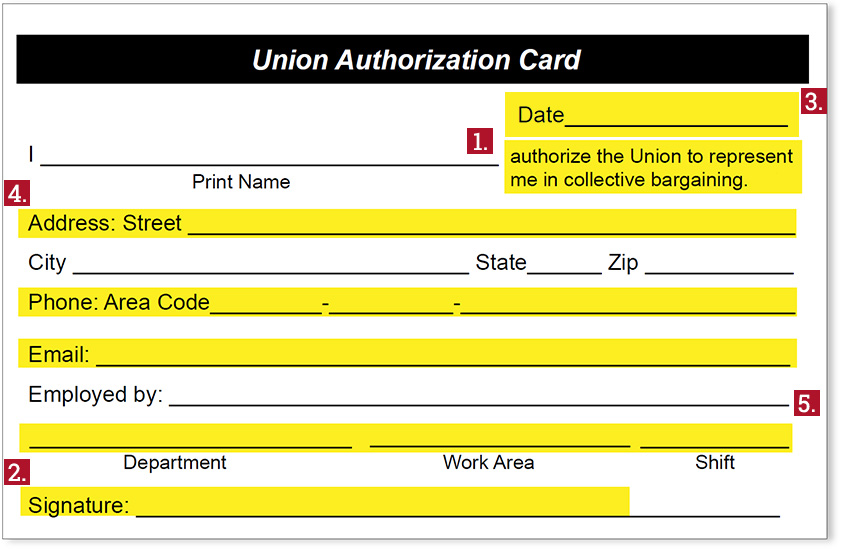Authorization Cards
Since unions are always looking for new dues-paying members, our team members are prime targets.
A union’s first step in recruiting is getting non-managerial and non-supervisory team members to sign union authorization cards whether in person, online or electronically.
To protect you and our organization, we want you to have the facts about union authorization cards if you’re ever approached by a union organizer selling memberships.

What You Need to Know
Click the questions below to see the answers.
Click here to ask questions about authorization cards and union representation.
A union authorization card, whether physical or electronic, is a legal and binding document that, when signed or submitted, gives a union the right to speak and bargain for you regarding your wages, hours, benefits and other terms and conditions of employment.
- You have the right to refuse to sign a card and tell the union “no.”
- Union organizers have been known to misrepresent the facts, make false statements, deliver empty promises and even threaten team members to get them to sign a card.
- Organizers have also been known to pressure and harass team members at work, home, on their personal telephones and via text and email message to get them to sign union authorization cards.
- An organizer might also tell you that just signing the card — or clicking the “submit” or “agree” button on an online authorization card – is harmless because you can still vote for or against unionization at an election. However, it’s possible for the union to use your signed card to demand recognition from the company and, if that occurs, an election will never occur. In that case, your signature, handwritten or electronic, could be your final vote. Don’t believe union organizers who say signing a card is just for more information about unions or to indicate interest.
Below is a sample of what a union authorization card might look like and what each section means.

- Union organizers may say that signing a card, or clicking the “accept” button, will merely get you more information or the opportunity for an election; but look closely. Nowhere on the card does it say it’s just for more information. In fact, by giving the union your authorization, you’re authorizing them as your legal representative to speak to management about your job, wages and working conditions.
- Your signature, handwritten or electronic, on this legal and binding document could be final. If you change your mind, the union is under no obligation to return it.
- A signed authorization card is presumptively valid for at least a year after you sign it.
- By obtaining your name, home address, home telephone number, mobile telephone number and personal email address, unions can and will contact you anytime — both inside and outside of work. That often includes text messages or bothersome phone calls at home, annoying or mass emails, or, in-person visits to get more information on Banner, as well as names and addresses of coworkers.
- Union organizers may ask for your job classification and current wages so they can get a sense of our pay ranges. No matter how much we pay our team members, union organizers will likely promise more. If so, ask for guaranteed promises in writing and see what happens. No union can guarantee team members will receive a raise.
Right now, any signed union authorization cards would be added to other signed cards and, if they obtain cards from a majority (50% + 1) of the team members in the targeted bargaining unit (which could be a department or just a group of workers), they can come to Banner and demand we recognize them as bargaining agents for all those team members.
If we refuse, the union or Banner may file a petition for an election with the National Labor Relations Board (NLRB). If the union’s necessary steps are met, the NLRB will schedule a secret ballot election where team members in the targeted bargaining unit are allowed to vote on whether or not they want to be represented by the union.
Accordion Content
A union authorization card, whether physical or electronic, is a legal and binding document that, when signed or submitted, gives a union the right to speak and bargain for you regarding your wages, hours, benefits and other terms and conditions of employment.
- You have the right to refuse to sign a card and tell the union “no.”
- Union organizers have been known to misrepresent the facts, make false statements, deliver empty promises and even threaten team members to get them to sign a card.
- Organizers have also been known to pressure and harass team members at work, home, on their personal telephones and via text and email message to get them to sign union authorization cards.
- An organizer might also tell you that just signing the card — or clicking the “submit” or “agree” button on an online authorization card – is harmless because you can still vote for or against unionization at an election. However, it’s possible for the union to use your signed card to demand recognition from the company and, if that occurs, an election will never occur. In that case, your signature, handwritten or electronic, could be your final vote. Don’t believe union organizers who say signing a card is just for more information about unions or to indicate interest.
Below is a sample of what a union authorization card might look like and what each section means.

- Union organizers may say that signing a card, or clicking the “accept” button, will merely get you more information or the opportunity for an election; but look closely. Nowhere on the card does it say it’s just for more information. In fact, by giving the union your authorization, you’re authorizing them as your legal representative to speak to management about your job, wages and working conditions.
- Your signature, handwritten or electronic, on this legal and binding document could be final. If you change your mind, the union is under no obligation to return it.
- A signed authorization card is presumptively valid for at least a year after you sign it.
- By obtaining your name, home address, home telephone number, mobile telephone number and personal email address, unions can and will contact you anytime — both inside and outside of work. That often includes text messages or bothersome phone calls at home, annoying or mass emails, or, in-person visits to get more information on Banner, as well as names and addresses of coworkers.
- Union organizers may ask for your job classification and current wages so they can get a sense of our pay ranges. No matter how much we pay our team members, union organizers will likely promise more. If so, ask for guaranteed promises in writing and see what happens. No union can guarantee team members will receive a raise.
Right now, any signed union authorization cards would be added to other signed cards and, if they obtain cards from a majority (50% + 1) of the team members in the targeted bargaining unit (which could be a department or just a group of workers), they can come to Banner and demand we recognize them as bargaining agents for all those team members.
If we refuse, the union or Banner may file a petition for an election with the National Labor Relations Board (NLRB). If the union’s necessary steps are met, the NLRB will schedule a secret ballot election where team members in the targeted bargaining unit are allowed to vote on whether or not they want to be represented by the union.

